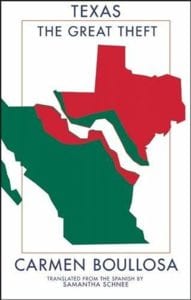
A new publishing house, Deep Vellum in Dallas, Texas, launches big with Texas: The Great Theft by one of Mexico’s preeminent writers.
Shelf Unbound: The story takes place in 1859 in the fictitious Texas-Mexico border town of Bruneville. What interested you in this time and place?
Carmen Boullosa: I got to that date and place by sheer chance —it was a gift. A name called my attention, Juan Nepomuceno Cortina (an uncle, a cousin and a nephew of my father were Juan Nepomuceno Cortina). I started digging around about him, found two great biographies (one small and charming, a second one thorough and comprehensive), and I got hooked, not by Juaan Nepomuceno so much as by Texas, his Texas, and how it ran in Mexican imagination. I chose a passage of Nepomuceno’s life, a small incident that triggered layers of events—among them the Cortina’s Troubles, the Mexican invasions into the American territory. I wasn´t after fiction but wanted to capture the legendary Mexican Texas. What interested me was to realize that Cortina, who had been so important, had vanished from Mexican memory. How could it be? I wanted him back, and used the Ouija Board to invite him. The board worked.
Shelf Unbound: You develop the story by detailing the reactions of a multitude of characters to the sheriff calling Don Nepomuceno a “dirty greaser.” I love the way you structured this story—how did you arrive at this approach?
Boullosa: My real character was that place—a dated Texas. Its face was the prairie, and its voice a corrido, a ballad. I had to follow the logic of a geographical space, as I pictured the prairie; more of the same, but the same always different. Plus I wanted its voice, a voice that was constructed as a corrido— repetitive and sweetly obsessive, a tough combination.
It was also like building a clock´s machinery. I gave myself a challenge: It had to be ample, like a prairie, and it had to be tight as the clock´s machinery. Because I wanted that Texas to have a soul, psychology, personality, and psyche like that: ample and tight. The clock-machinery form suited me to build Texas´ persona.
Shelf Unbound: In this novel I was particularly moved by the plight of Eleonor, the mail-order bride of abusive Minister Fear, who is so trapped that she wants to die. What is the purpose of this character in the overall story?
Boullosa: Luckily, Eleonor escaped my agenda. I wanted the characters to be part of my tight machinery, gears to my service. Eleonor wanted to be a real person. As did Magdalena. The girls had more heart and resisted more my clockmaker tools—not all but some did. Maybe because as it´s a cowboy story, and girls are not the ideal protagonists (though hell they wanted it!), and when they are able to fit in, and make that hostile world their own, they are worth the trip.
Shelf Unbound: What do you think the residents of Bruneville would make of today’s border situation?
Boullosa: They would pretend they do not live on the border. They would turn their backs to the facts and pretend to ignore the violence and death ruling the south. But they would enter the business and no doubt profit from the revenues of all the illegal merchandize (arms, drugs, humans) and help it grow.
Shelf Unbound: Robert Bolaño has called you “Mexico’s greatest woman writer.” Does it bother you at all to be categorized as a “woman writer” rather than just a “writer”?
Boullosa: Well, I´m not sure I am a woman writer. Sometimes I am, sometimes I´m more of a male writer. But men have no remedy (“los hombres no tienen remedio”). A girl is a girl is a girl. Now I might be approaching “de-girlization”, because old age might really make me neutral to others’ eyes (not to mine! I feel more woman and more male than ever). Maybe then I won´t be a woman writer, but a writer.
